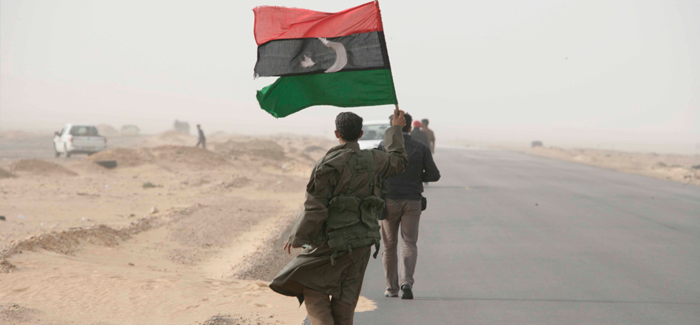
In 2011 international air strikes backed by the United Nations helped Libyan rebels overthrow Muʽammar Gaddhafi. (Photography by Nasser Nouri, CC BY-NC-SA 2.0)
A scholar raises questions about the humanitarian claims of some military ventures.
At the end of the first day of Crisis of Humanitarianism/Humanitarianism in Crisis, a conference sponsored in April by the Human Rights Program, keynote speaker Didier Fassin argued “exactly the opposite.” Humanitarianism, he said, “has never been so powerful and imperial.” More and more, it is invoked to prompt domestic government action, raise money for nonprofit organizations, and justify multilateral military intervention.
Few would find fault with the stated goal of providing aid to people in distress, but when nearly everyone, from corporations to dictators, is taking up the mantle of humanitarianism, Fassin argued, we need to question its underlying assumptions and uses. “What is humanitarianism?” he asked. “Where does it come from? How can it be critiqued?”
The James D. Wolfensohn professor of social science at Princeton University’s Institute for Advanced Study, Fassin was a public health physician and later a vice president of Doctors Without Borders who explored the political roots and responses to health epidemics from AIDS to lead poisoning. As an academic, he has written ethnographies of institutions like police, justice, and prison systems. And his research seeks to identify the principles behind contemporary morality and analyze them in historical and political context.
The language of humanitarianism, Fassin said, nearly always obscures a complex set of motivations. Take, for instance, the United Nations Security Council Resolution to authorize international action, including air strikes, in Libya in 2011—the first time that the responsibility to protect principle, approved by the UN General Assembly in 2005, was used to justify military intervention on humanitarian grounds.
For its proponents, the subsequent bombing of Libya was an exemplar of a just war. For Fassin it was “warmongering in the name of humanitarianism.” Despite the fact that the Libyan leader was a brutal despot known to be responsible for the 1988 bombing of Pan Am flight 103, the West was courting Gaddhafi to help fight al-Qaeda in the Middle East and to resume trade with an oil-rich and arms-hungry Libya. “The dictator had become a shameful friend” of Western leaders, much to the shock of their constituencies, said Fassin. “Intervening in Libya could erase the taint of this humiliation.”
But how “humanitarian” was the Libyan intervention? For Fassin the record on that is also deeply problematic. Civilian casualties from the UN bombing were high, the region was destabilized, and Western governments largely turned their backs on Libyan refugees fleeing the crisis.
Fassin pointed to other troubling examples. A furor over Kuwaiti babies left to die after Iraqi soldiers took their incubators helped galvanize American support for the first Gulf War in 1990. The story turned out to be apocryphal, concocted by a public relations firm working for the Kuwaiti government. By the time the hoax was revealed, the war was already under way, leading to the deaths of thousands of Iraqi noncombatants. During the Rwandan genocide in 1994 a French army mission with ostensibly “strictly humanitarian” objectives—to help protect refugees and civilians at risk—actually had a political objective apart from humanitarianism, Fassin said: to protect the Hutu regime. The result was to extend violence in the region for years.
The question that Fassin’s talk boiled down to was, why? “Why do images and narratives of suffering have such an impact on the way politics is enacted? Why is it that the most effective way to legitimize actions is by striking the chord of compassion?” Because, he concluded, in an increasingly unequal world, humanitarianism promises solidarity. It “bridges the contradictions of our world and makes the intolerability of its injustices somewhat bearable.”
Today, “with the entry of suffering into politics, salvation comes not through the passion one endures,” Fassin argued, “but through the compassion one feels.” Humanitarian workers—who once risked their lives on the battlefield but now operate “under the protection of the belligerents”—enjoy what Fassin called “a moral untouchability,” and humanitarianism as a whole is “granted a sort of immunity from critique.”
Humanitarianism’s emotional pull is powerful—enough to silence the dissent that is often prompted by military intervention. It falls to social scientists, Fassin said, to observe and elucidate how humanitarianism operates in domestic and global politics. “What is gained and lost, or simply different,” he asked, “when one talks of suffering instead of inequality, of trauma instead of violence, of compassion instead of justice?”
